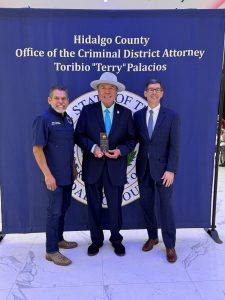The First Called Special Session, which convened from July 21 to August 15, was initially called to address issues vetoed by Governor Greg Abbott at the end of the Regular Session in June. However, the agenda changed after President Donald Trump urged Texas to add five more Republican congressional seats and following the severe floods in Central Texas around the 4th of July weekend. The floods killed more than 130 people, including 27 girls and counselors at Camp Mystic located in Kerr County. The First Called Special Session ended without any bills passing due to a quorum break in the Texas House of Representatives, prompting Governor Abbott to call a Second Special Session. This second session began on August 15 and ended on September 4.
Overall, Governor Abbott had 26 topics on the agenda for the Second Called Special Session. A total of 408 bills were filed, and ultimately, 21 bills were passed and sent to Governor Abbott. Below is a summary of some of the bills that were passed during this special session.
Bills Passed During the Second Called Special Session:
HB 1 – Youth Camp Emergency Plans and Preparedness
The Youth CAMPER Act sets emergency preparedness and safety standards for youth camps in Texas. It establishes a Youth Camp Safety Multidisciplinary Team to create minimum standards and requires camp operators to develop and submit detailed emergency plans for various situations. Compliance will be enforced through inspections, training, and licensing.
SB 1 – Campground and Youth Camp Safety
The Heaven’s 27 Camp Safety Act improves camper safety by requiring youth camps to meet basic emergency preparedness standards, including developing and submitting safety plans, restricting the location of cabins in floodplains and hazardous areas, establishing evacuation protocols, and maintaining emergency equipment, such as reliable dual broadband internet connections for uninterrupted communication during emergencies. The bill also introduces enhanced training requirements for camp counselors, equipping them with knowledge of inclement weather and designated escape routes to enable them to flexibly pivot from standard practices when emergency conditions warrant a different course of action. Additionally, by establishing similar safety requirements for other types of recreational campgrounds, SB 1 improves the safety of campers across the state in a natural disaster.
SB 3 – Outdoor Warning Sirens
This bill requires the installation and maintenance of outdoor warning sirens in Texas areas prone to flash flooding, as identified by the Texas Water Development Board. It establishes a grant program through the Governor’s Office to assist local governments with costs associated with these sirens and sets rules for their operation and testing. The goal is to improve public safety by providing timely alerts to residents in flood-prone areas.
SB 5 – Relief Funding for Hill Country
This bill allocates more than $280 million in funds from the economic stabilization fund for various programs under the Governor’s Office and the Department of State Health Services. These funds will enhance disaster preparedness, response, and recovery efforts, including matching federal disaster funds, local grants for flood warning systems, and improvements in meteorological forecasting.
SB 18 – Maintaining Texas Dams (Vetoed by the Governor on 9/17)
This bill exempts certain dams or reservoirs, managed by qualified local sponsors, from needing a permit from the Texas Commission on Environmental Quality (TCEQ) if they control erosion, floodwater, and sediment and have a normal storage capacity of no more than 200 acre-feet. It allows sponsors to construct, maintain, and divert water from these sites without a permit, provided they meet specific criteria, and requires TCEQ to adopt rules by April 1, 2026.
HB 20 – Preventing Fraudulent Charitable Solicitations During Disasters
The Disaster Scam Response Act creates a designation program for nonprofits and financial institutions to be recognized for soliciting disaster relief donations during declared disasters. The Texas Secretary of State will establish and administer the designation program. The bill also creates criminal offenses and increases penalties for fraudulent solicitations and theft related to disasters, including malicious solicitation of victims. Additionally, the Act allows victims and donors to recover damages from dishonest solicitors.
HB 8 – STAAR Exam Replacement
This bill mandates the transition of Texas public school assessments from the STAAR program to a new supportive assessment program by the 2027-2028 school year. Three new, shorter assessments taken throughout the year will replace the STAAR test. The new test will be divided into beginning-, middle-, and end-of-year assessments for reading and math in grades three through eight, science in grades five and eight and social studies in eighth grade. The bill also would provide greater transparency regarding standardized tests and the public school accountability system. By requiring the results of the assessments to be provided within 48 hours, the bill would help parents and teachers know when students are struggling without having to wait months for results.
SB 11 – Protecting Human Trafficking Victims
This bill provides an affirmative defense for individuals prosecuted for certain offenses if they were victims of trafficking or coercion. It establishes criteria for when this defense applies, ensures that the conduct was compelled, and clarifies evidentiary standards. The bill applies to offenses committed after its effective date.
SB 16 – Stopping Title Theft and Deed Fraud
This bill establishes offenses for real property theft and fraud, defining penalties and procedures for prosecution. It mandates recording requirements for judgments related to these offenses, requires identification for recording property documents, and outlines restitution obligations for those convicted. The bill enhances protections for vulnerable populations and nonprofits while introducing measures for law enforcement notification and lien fraud prevention.
HB 16 – Court Omnibus Bill
This bill focuses on reforms in juvenile justice, court-ordered mental health services, judicial district organization, and procedural rules for civil and criminal cases. It limits the detention of children, modifies criteria for court-ordered mental health treatment, and establishes new judicial districts. The bill also includes provisions for exemptions from grand jury service and protections for the personal information of public officials and law enforcement personnel.
In Hidalgo County, this bill creates Probate Court No. 2 of Hidalgo County and removes the $750,000 statutory cap in civil cases filed in the Hidalgo County Courts at Law.
HB 4 – Changes to Congressional District Boundaries
This bill redraws congressional districts in Texas based on 2020 Census data, overriding previous districting laws. It specifies the geographic boundaries for each district and sets them to take effect for the 2026 elections. The bill includes provisions for courts to interpret any omissions according to legislative intent and repeals prior laws regarding congressional districts.
SB 12 – Attorney General Authority to Prosecute Election Crimes
This bill grants the attorney general the ability to prosecute election fraud in Texas, bypassing constitutional restrictions on this authority. Prosecution of such cases has traditionally been the responsibility of local district attorneys, a practice upheld in a recent ruling.
SB 54 – Update to Voter Registration Procedures
This bill modifies procedures concerning voter registration and address changes. It allows voters who move within the same county to vote in their previous precinct if they meet certain requirements. The bill also changes the effective date for registration updates and removes a provision related to immediate changes.
HB 18 – Prohibit Lawmakers from Fundraising During Quorum Break
This bill prohibits Texas legislators from accepting contributions that exceed daily per diem limits during an ‘impeding absence’—an unexcused absence outside the state that hinders legislative proceedings. It establishes procedures for returning prohibited contributions, imposes civil penalties for violations, and outlines enforcement through legislative officers and district courts.
SB 8 – Bathroom Regulations for Government Buildings
The Texas Women’s Privacy Act requires state agencies and political subdivisions to designate certain private spaces for exclusive use by individuals of one biological sex and sets strict penalties for violations. It mandates that the Texas Department of Criminal Justice house inmates according to their biological sex and restricts family violence shelters for females to serve only women and their minor children. The Act establishes a civil penalty system, a private right of action for affected individuals, and limits judicial review related to enforcement.
HB 25 – Over-the-Counter Ivermectin
This bill authorizes a pharmacist to dispense ivermectin to a person without requiring a prescription order from a licensed health care practitioner. The pharmacist would have to act in accordance with any written standardized procedures or protocols issued by the Texas State Board of Pharmacy, including, if required, providing the person with instructions on the proper use of ivermectin. The bill specifies that a pharmacist acting in a reasonably prudent manner would not be criminally or civilly liable or subject to professional disciplinary action for dispensing ivermectin in accordance with the bill.
HB 7 – Limiting the Use of Abortion Pills
This bill creates a new enforcement mechanism for the state’s strict abortion ban, by allowing regular citizens to file civil lawsuits against anyone who ships abortion pills into Texas or who otherwise distributes the pills within the state. The bill would allow lawsuits against out-of-state doctors who prescribe or ship abortion pills, family and friends who help a woman obtain abortion pills and others.








